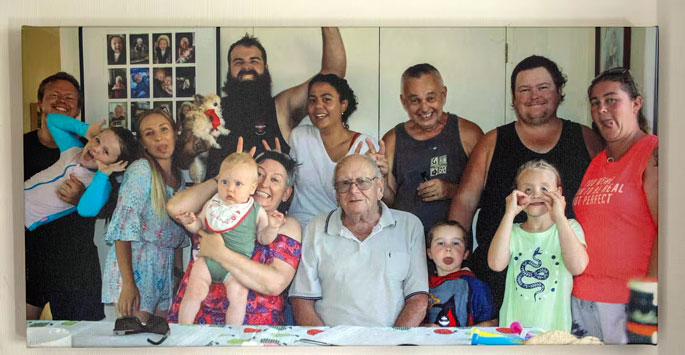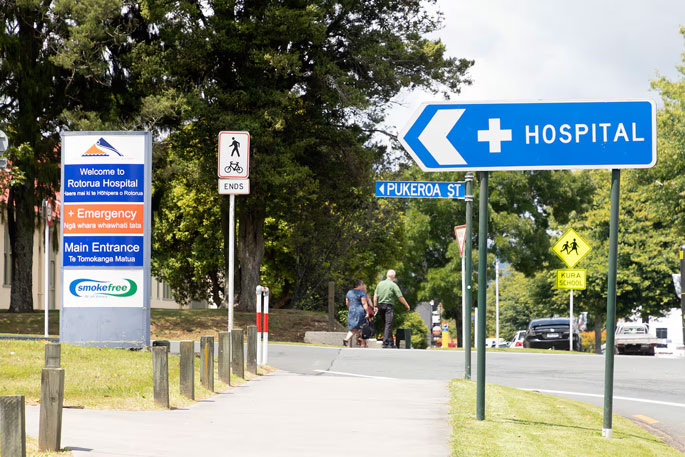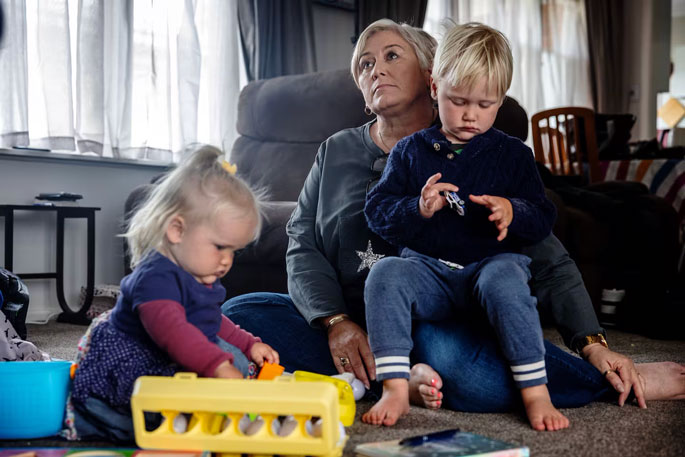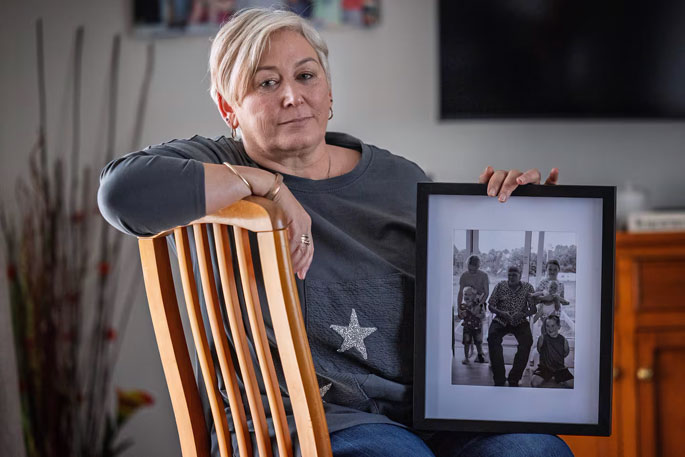The daughter of a man who died at Rotorua Hospital believes her dad’s death after a “huge fall” on a ward was preventable and the result of an overburdened health system.
Brian Brosnahan, 83, was taken by ambulance to the hospital’s emergency department (ED) on July 31 because of severe pain in his legs from cellulitis.
Four days later – after being put on a ward at the hospital – he fell over, hit his head and died a few hours later.
His daughter, Kerry Mason, told the Herald his death was “absolutely 100%” preventable, although Health New Zealand Te Whatu Ora has defended its care of the patient.
“I don’t think that this should happen in New Zealand. How does it happen in New Zealand in this beautiful country that we have?” she said.
Mason believes the tragedy was a symptom of a stretched system where staff are “overworked and underpaid”.
 Brian Brosnahan, centre, died in Rotorua Hosptial on August 4 after a fall his family believe was preventable. Photo / Mike Scott.
Brian Brosnahan, centre, died in Rotorua Hosptial on August 4 after a fall his family believe was preventable. Photo / Mike Scott.
She said staff on the ward were “flat out” and believes they didn’t have time to prevent her dad, who couldn’t walk without assistance, leaving his bed.
“There’s no way in my mind that I would ever think they [staff] did it out of a lack of care. It’s because they are so busy and there’s not enough of them.”
‘24-36 hours’ in ED
Brosnahan had multiple health issues, including emphysema, heart issues and cellulitis.
It was pain from the cellulitis that prompted his daughter to call an ambulance in late July to rush him from his home in Lake Hamurana to Rotorua Hospital’s emergency department.
“I had to call an ambulance for him because he couldn’t get out of bed, his legs hurt so bad,” she said.
Mason told the Herald her dad spent between 24 to 36 hours in the “busy” ED before he was shifted to a bed on a ward.
She didn’t feel this was acceptable.
New health targets which came into effect on July 1 aim to ensure patients are admitted to a ward or short-stay unit, discharged or transferred from an ED within six hours.
A spokeswoman for Health Minister Shane Reti told the Herald the wait at the ED was not acceptable.
“It is absolutely not an outcome anyone would want,” she said.
“The minister has been very clear about prioritising an ED target and improving flow, to avoid situations where patients are waiting for a prolonged period.”
‘His whole face was black and blue’
After a lengthy stay in the ED, Brosnahan was eventually admitted to a bed on a ward.
By August 3, Mason said her dad was more talkative and appeared to be showing signs of improvement.
However, shortly after she left the hospital that day with her husband, she received a panicked phone call from her cousin who’d just arrived for a visit.
“She said I’ve just turned up at the hospital and walked in the ward and I walked past all these nurses because there was somebody on the floor and she said it was your dad.”
Brosnahan had got out of bed, collapsed and hit his head.
He was immediately taken for an X-ray and once he was returned to the ward, Mason said her father’s demeanour had changed significantly.
“I looked down to my dad and I said, ‘How hurt are you, Dad?’ And he looked at me and he couldn’t talk because his whole face was just black and blue.”
She believes given his state, staff knew her father couldn’t leave his bed.
“Somebody saw him sitting up in bed, they knew that his legs probably would not have held him as he couldn’t take himself to the toilet.”
Just after midnight on August 4, Mason received a call from the hospital notifying her that her dad had died.
 Rotorua Hospital. Photo / Andrew Warner.
Rotorua Hospital. Photo / Andrew Warner.
Health New Zealand acknowledged the hospital was busy on the day he fell but defended the care he received.
Group director of operations for Te Whatu Ora Lakes Alan Wilson said his thoughts were with Brosnahan’s family.
“We recognise the loss of the patient and sympathise with their whānau and friends. We acknowledge the hospital was busy at this time, however, this case has been reviewed and appropriate care was provided,” he said.
‘You can see they’re tired’
 Kerry Mason, whose father died after a fall in Rotorua Hospital, plays with her grandchildren Ruby and Oscar Judson. Photo / Mike Scott.
Kerry Mason, whose father died after a fall in Rotorua Hospital, plays with her grandchildren Ruby and Oscar Judson. Photo / Mike Scott.
Mason worries about the future of New Zealand’s health system, saying staff on the ward where her dad was before he died “never stopped” working.
“They were always on computers or talking to another nurse. They never stopped, [they were] flat out and you can see they’re tired,” she said.
She said there had been too many years of underinvestment in health and didn’t think the Government was treating it as a top priority.
“I’ve got family, I’ve got little grandkids that might need that one day. We all need it. We pay our taxes for this.”
She wasn’t surprised so many good health staff were heading overseas.
“They’re overworked and underpaid. They are not given any respect at all,” she said.



1 comment
Hmmm
Posted on 22-10-2024 17:33 | By Let's get real
It's unfortunate that the family has a need to find someone to blame in this situation. These trips, slips and falls are far more regular occurrences in a home environment than in any public domain and although I sympathise with the family for the loss of an elderly unwell relative, it may have happened and been even more upsetting in a home environment.
My extremely fit and active father-in-law lay on the floor with a broken hip for two days and was not capable of reaching the phone to call for help before being discovered.
You can't hold anyone responsible for a patient being out of bed, other than the patient and presumably this gentleman wasn't tripped up by another party.
Accidents and misfortune happen, even when every eventuality is covered and managed by trained professionals.
Leave a Comment
You must be logged in to make a comment.